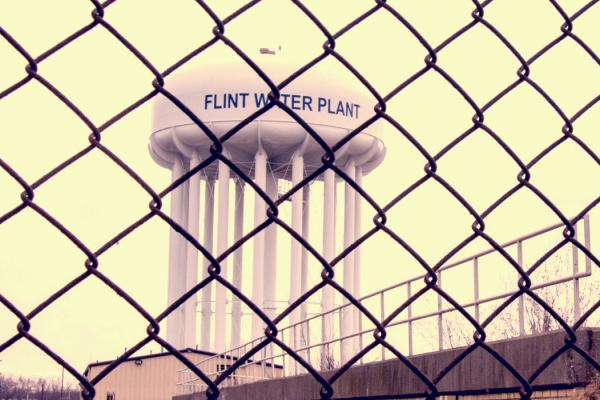Last night’s Democratic presidential primary debate in Flint, Mich., ran the gamut on issues, from guns to trade to racism to religion.
But it was also the most environmentally focused debate yet in the 2016 campaign.
Here’s a quick summary of the main environmental issues that came up (and a couple that didn’t).
1. Pressure is intensifying for new proposals and major solutions in Flint and across the country.
The Democratic candidates upped the ante significantly for solutions for Flint: As of last night, both have called for Gov. Rick Snyder to resign, and have reiterated that any EPA officials who knew about the crisis in Flint and did not take appropriate action should be fired as well.
But each also had some novel proposals of their own for dealing with the drinking water crisis in Flint.
Sen. Bernie Sanders called for the CDC to test every person in Flint for lead exposure. He also seemed to call for a sort of reparations for the fact that Flint’s water bills have been so astronomically high even as the citizens were drinking poisoned water:
“First thing is you say, people are not paying a water bill for poison and that is retroactive,” he said.
Meanwhile, Secretary Hillary Clinton broadened the scope and drastically accelerated the timeline for dealing with the environmental hazard posed by lead:
“I want us to have an absolute commitment to getting rid of lead wherever it is because it's not only in water systems, it's also in soil, and it's in lead paint … we will commit within five years to remove lead from everywhere.”
While their ambition for swiftly dealing with such an urgent health crisis is commendable, such a timeline is sadly not exactly feasible — for the simple reason that we just don’t know where all of the lead pipes in cities all over the country are even located.
2. On fracking, Clinton is trying to shrink the amount of daylight between herself and Sanders.
Clinton came out with her strongest position on fracking to date, though she wasn’t quite willing to go as far as Sanders. She laid out three very specific criteria/conditions under which she would oppose fracking:
1. “When any state or locality is against it” (extremely relevant in her home state of New York, which has successfully banned fracking after years of dogged grassroots campaigning);
2. “When the release of methane or the contamination of water is present” (both of these conditions, especially methane release, are all too common); and
3. “Unless we can require that anybody who fracks has to tell us exactly what chemicals they are using.”
As noted in Grist, for Clinton to be arguing that strict fracking regulations should be the rule, rather than exception, is a significant shift.
3. On Trans-Pacific Partnership, there was zero discussion of its climate impacts.
The Trans-Pacific Partnership is an enormous trade agreement championed by the Obama administration, now in need of a simple majority congressional vote to be ratified by the United States.
The TPP has set off an absolute firestorm of opposition from environmentalists (for nitty-gritty details, the Sierra Club recently put out a report that provides perhaps the most comprehensive statement of the green case against TPP).
However, neither candidate discussed the environmental facet of the TPP.
Sanders seemed to have decided that zeroing in on the impacts on manufacturing jobs was the more strategic frame for him, given the location of the debate and the fact that the Democratic primary is firmly ensconced in the Rust Belt (Michigan votes tomorrow and Ohio on March 15).
Clinton was eager to pivot away from TPP entirely. She explained her shift on the issue last night by saying that “I came out against the TPP after it was finished. I thought it was reasonable to actually know what was in it before I opposed it. I oppose it.”
Unfortunately, whatever your views on TPP, Clinton’s argument that she needed “to know what was in it” before taking a position is disingenuous. It’s widely documented that she championed the deal for years during her tenure at State, pushing for TPP at least five years before the final text was released in October 2015.
4. Both candidates see value in claiming they have a comprehensive climate plan …
You can read Secretary Clinton’s climate plan here, and Senator Sanders’ plan here. Clinton chose to highlight the provisions of her plan relatedly to massively expanding solar energy, while Sanders touted the $15-per-ton carbon tax bill he introduced in Congress last December.
5. … But neither candidate emphasized environmental justice, per se.
To be sure, there was prolonged discussion of the Flint water crisis and of climate change and fracking. But neither candidate brought up the fact that many environmental burdens are being disproportionately borne by communities of color.
Both candidates have addressed Flint’s problems as an issue of environmental justice in the past few months. Both have even said explicitly that Flint would have never happened in a rich, white Michigan suburb. But neither did so last night, on a very public stage.
In spite of this last disappointment, the debate was arguably the best of the campaign so far for environmental issues. For those of us who care about what happens to the people of Flint and to those affected by climate change and fracking, it will be crucially important to keep up public pressure to avoid a scenario in which, as Sanders put it last night, “at a certain point the TV cameras and CNN . . . disappear.”
Got something to say about what you're reading? We value your feedback!

